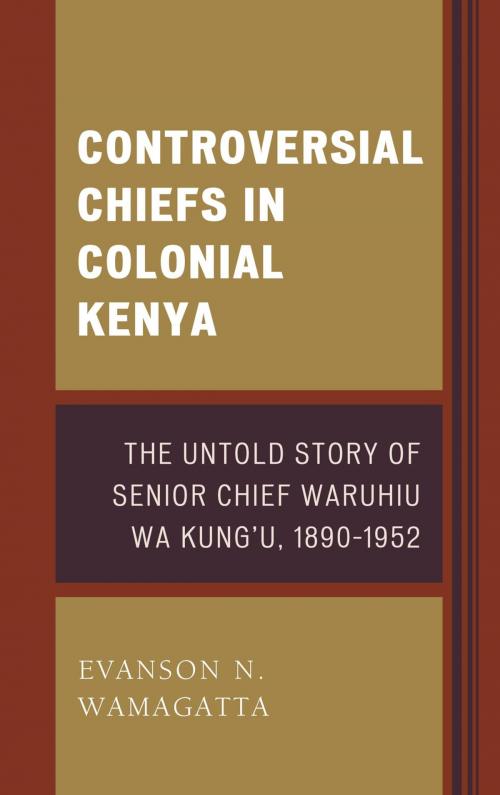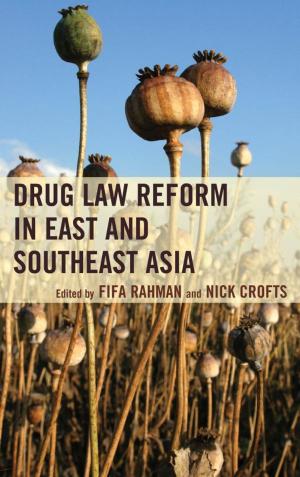Controversial Chiefs in Colonial Kenya
The Untold Story of Senior Chief Waruhiu Wa Kung'u, 1890–1952
Nonfiction, Social & Cultural Studies, Political Science, Politics, Leadership, History, Africa, International| Author: | Evanson N. Wamagatta | ISBN: | 9781498521482 |
| Publisher: | Lexington Books | Publication: | April 21, 2016 |
| Imprint: | Lexington Books | Language: | English |
| Author: | Evanson N. Wamagatta |
| ISBN: | 9781498521482 |
| Publisher: | Lexington Books |
| Publication: | April 21, 2016 |
| Imprint: | Lexington Books |
| Language: | English |
Senior Chief Waruhiu wa Kung’u is one of colonial Kenya’s most controversial chiefs. His name has gone down in history as a traitor who was assassinated because he sold his country to the British colonizers. This book is the untold story of the controversial life of Senior Chief Waruhiu who served the colonial government for thirty years. He believed his white superiors’ authority was God-given and to disobey them was tantamount to disobeying God himself. That was why he was considered loyal, obedient, dependable, responsible, efficient, and a tower of strength.
Chief Waruhiu’s violent death dealt his reputation a devastating blow, as it provided his critics with a basis to portray him as a traitor who sold out to the colonizers. Although Waruhiu believed that the Africans were not yet ready for self-government—and that they could not attain it through violence—that did not make him a traitor. Other chiefs also believed that and yet were not labeled as traitors. However, this did lead to him being considered a very pro-government and pro-European chief who was opposed to the aspirations of his people and he, as a result, deserved to be killed.
Although it is believed that Waruhiu was killed by Mau Mau, there is no evidence to support that claim. The white settler community gained a lot from Waruhiu’s murder as it paved the way for it to get what it had been demanding for a long time—a declaration of a state of emergency and the arrest and detention of African leaders. It is very likely that some leaders of the white settlers, working together with government officials, were probably behind Waruhiu’s murder. The police, the prosecution, and the court seemed determined to make the murder charges against the accused suspects stick in spite of glaring discrepancies and contradictions in the evidence against them. Above all, the prosecution failed to prove beyond any reasonable doubts that Waweru and Gathuku killed Waruhiu. Thus, the mystery of who killed Waruhiu and those behind his murder still remains unresolved and the perpetrators of the murder may never be known.
Senior Chief Waruhiu wa Kung’u is one of colonial Kenya’s most controversial chiefs. His name has gone down in history as a traitor who was assassinated because he sold his country to the British colonizers. This book is the untold story of the controversial life of Senior Chief Waruhiu who served the colonial government for thirty years. He believed his white superiors’ authority was God-given and to disobey them was tantamount to disobeying God himself. That was why he was considered loyal, obedient, dependable, responsible, efficient, and a tower of strength.
Chief Waruhiu’s violent death dealt his reputation a devastating blow, as it provided his critics with a basis to portray him as a traitor who sold out to the colonizers. Although Waruhiu believed that the Africans were not yet ready for self-government—and that they could not attain it through violence—that did not make him a traitor. Other chiefs also believed that and yet were not labeled as traitors. However, this did lead to him being considered a very pro-government and pro-European chief who was opposed to the aspirations of his people and he, as a result, deserved to be killed.
Although it is believed that Waruhiu was killed by Mau Mau, there is no evidence to support that claim. The white settler community gained a lot from Waruhiu’s murder as it paved the way for it to get what it had been demanding for a long time—a declaration of a state of emergency and the arrest and detention of African leaders. It is very likely that some leaders of the white settlers, working together with government officials, were probably behind Waruhiu’s murder. The police, the prosecution, and the court seemed determined to make the murder charges against the accused suspects stick in spite of glaring discrepancies and contradictions in the evidence against them. Above all, the prosecution failed to prove beyond any reasonable doubts that Waweru and Gathuku killed Waruhiu. Thus, the mystery of who killed Waruhiu and those behind his murder still remains unresolved and the perpetrators of the murder may never be known.















